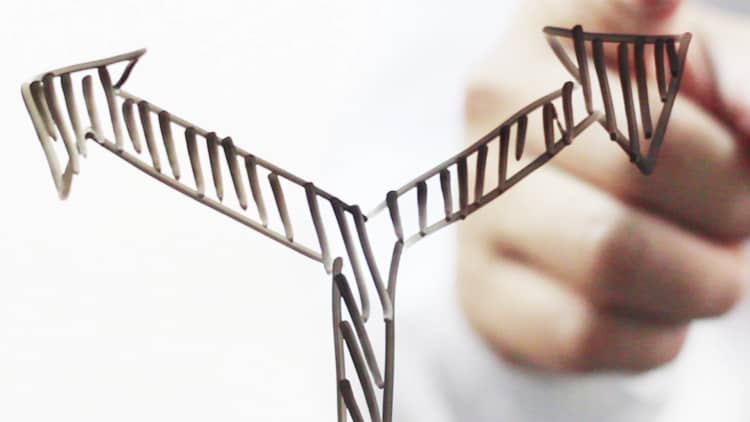I'm halfway through my two-month-long "cash diet," which allots me $60 a week to cover everything besides my fixed costs, including groceries, bars and restaurants, laundry, toilet paper and transportation.
After four weeks of spending less than $60 each week, I've learned some good ways to stretch a dollar in an expensive city like New York.
If you're looking to save more and spend less, here are my top seven tips.
TRACK EXPENSES
I take five minutes at the end of each day to record everything I bought in an Excel spreadsheet. This habit works for a few reasons:
I'm able to see just how easily expenses can add up. I didn't realize how much money I blew through until I started writing down everything I bought. It gives me an idea of where I tend to spend mindlessly and where I can cut back.
It holds me accountable. I've found that I'm more deliberate with every purchase, as the last thing I want to do at the end of each day is have to record an unnecessary expense.
It challenges me to lower my costs each day, week and month. Recording expenses becomes a bit of a game, and you start to see how many days in a row you can spend $0, or under $5.
I know exactly how much money I have remaining in my budget at all times. If Monday and Tuesday are high-spend days, for example, I'll make sure to cut back for the rest of the week.

GO HOMEMADE
Restaurant bills and bar tabs have a way of adding up. The more food you make at home, the more you save. Plus, making your own meals tends to be healthier than eating out.
You can also keep a safe distance from drugstores, where it's easy to mindlessly spend $5 to $10 on drinks and snacks.
That being said, I haven't had to completely eliminate restaurants and bars — they're a fun way to socialize, and everyone is allowed the occasional splurge. I just make sure I establish a budget for dining out and stick to it.
CUT BACK AT THE GROCERY STORE
Your grocery bill is entirely under your control — you're not locked into a contract like you are with your cellphone or internet — and chances are, you can find ways to cut back.
Start by figuring out how much you spend on groceries each month. Look at your credit card statements or, if you're like me, sort through your receipts. Use the data to form an estimate and then aim to cut that number.
Set a realistic goal, like cutting your bill by 25% or a specific dollar amount, that makes sense for your spending habits.
Check out more tips on how to trim your grocery bill.

SET SAVINGS GOALS
My last week on the cash diet happens to align with a pre-planned trip to New Orleans for Mardi Gras. While the trip's big costs are out of the way — I bought my flight in October and I'll be staying with a friend — stretching $60 over the four days I'm there could be tricky. That's why I set up a "Mardi Gras fund."
Having this specific savings goal has been an incredibly effective money-saving strategy. Every time I'm about to purchase something that I don't necessarily need — a latte, trip to the nail salon, or my biggest vice, Vitamin Water — I envision what that money could buy me in New Orleans and then question whether or not the purchase is worth it.
The fewer Vitamin Waters I buy now, the more beignets I can have in New Orleans.
REMEMBER IT'S OK TO SAY NO
It's incredibly easy to spend money in any city, and the pressure to spend doesn't help. If your friends are ordering appetizers and several rounds of drinks, chances are you will too, even if you don't have the money.
After living on $60 a week in cash, I've gotten more comfortable politely declining social gatherings altogether. I have said yes to a few things, but it's been valuable to learn that it's OK to show up, socialize, not spend any money, and focus on the company rather than the consumables.
Just because wining and dining is the most popular way to socialize doesn't mean it's the only way. Look up cheap or free activities in your area, and trade in happy hour for a trip to a museum or a park.

WALK OR BIKE TO WORK
This may be more feasible for some than others, but if possible, get to work a cheaper way.
I traded in my 12-minute subway ride for a 35-minute walk to work and it saves me $117 a month, or the price of New York's monthly Metro pass. That's over $1,400 a year. Plus, the daily 3.4-mile round trip is built-in exercise and quality thinking time.
If an active commute is completely out of the question for you, check out other ways to cut back on commuting costs.
GO CASH-ONLY
When you have to stick to a tight budget, I've found that ditching your plastic for bills can make a world of difference. I get a better idea of exactly how much money I'm spending and how much is remaining in my budget. Plus, there's something about physically handing over bills and watching my money disappear right in front of me that causes me to value it more.
Withdraw a predetermined amount of money for the week and commit to spending only that amount. Leave your credit cards at home if you'll be tempted to swipe them. It's impressive the difference it can make.
Want to try out the Cash Diet? Check out how I'm doing it in New York City for eight weeks and head to an ATM this afternoon.



